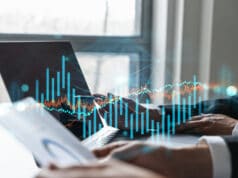Overview
Legendary traders of financial markets, some of whom were also investors and economists, have said powerful words that still ring true today. The list below are 10 of these quotes and the main lessons we can learn from each:
William Gann (1878-1955) on exploiting the weaknesses of human nature in the markets
A successful trader studies human nature and does the opposite of what the general public does.
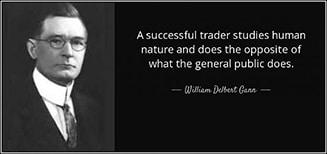
With enough experience, any form of analysis attempts to discern and exploit the predictable foolish behavior of the masses. It’s a widely known premise that trading is a zero-sum game. Any successful trader would attest that their actions are contrary to how losing traders normally behave in the markets. While trading is not necessarily a competition against others more than it is a competition against yourself, market psychology plays out in any given trade and is crucial to grasp.
Jack Schwager on being wrong as a trader
Being wrong is acceptable, but staying wrong is totally unacceptable.
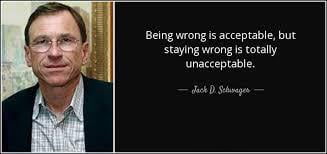
In other words, Jack Schwager is emphasizing there is a difference between losing a trade and staying for too long in a losing trade. This realization is the main reason why stop losses are arguably the only method to prevent traders from staying too long in losing positions that have the destructive potential to wipe out their trading accounts.
Alexander Elder on sticking to your rules and not focusing on money
The goal of a successful trader is to make the best trades. Money is secondary.
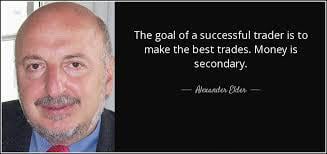
Making the best trades is ensuring one has thoroughly followed all their rules and taken the best trades. It’s a natural tendency for humans to focus too much on the money they could potentially make on a position without emphasizing more on following their system and rules to the tee. The reward of any position is very unpredictable and never guaranteed. However, executing the best trades is predictable, regardless of the outcome.
William Eckhardt on intelligence
I haven’t seen much correlation between good trading and intelligence. Average intelligence is enough. Beyond that, emotional makeup is more important.
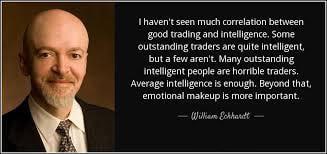
Traders battle between intelligence and emotions. Though, as William puts it, you don’t need to be highly intelligent in the markets. A decent level of natural intelligence is required. However, too much of any quality can be a detriment. Perhaps emotional intelligence offers an outstanding balance where one is decently intelligent by nature but equally can control their emotions when trading.
Bruce Kovner on position sizing
My experience with novice traders is that they trade three to five times too big. They are taking 5 to 10 percent risks on a trade when they should be taking 1 to 2 percent risks. The emotional burden of trading is substantial; on any given day, I could lose millions of dollars. If you personalize these losses, you can’t trade.
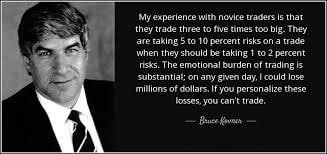
Most losing traders are excellent analysts but fail mainly due to inconsistent and large position sizes relative to their accounts. Considering the appropriate position sizing that allows you to stay in the game even after a drawdown is the ultimate money management foundation.
Warren Buffett on the power of patience
The stock market is a wonderfully efficient mechanism for transferring wealth from the impatient to the patient.
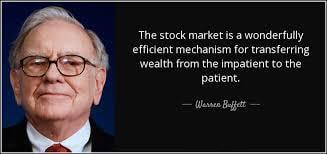
‘The Oracle of Omaha,’ Warren, Buffett, is widely considered to be the greatest investor of all time. Of all the character traits that a trader should have, patience is arguably the single most important one and is the glue for consequent characteristics. Patience plays into giving the market time in holding positions to waiting for our set-ups to form. Buffett gained worldwide attention and success for his patient value investing and long-term ‘buy and hold’ investing philosophies. Though we don’t need to hold positions for as long as he did, we can apply patience in our own time horizons.
John Maynard Keynes (1883-1946) on the irrationality of the markets
Markets can remain irrational longer than you can remain solvent.
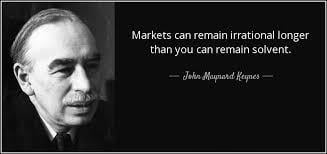
Markets can be a very volatile cog dealing with a gazillion of human emotions, behaviors, and expectations. Throughout history, there have been many unexplainable moves that have baffled even the cleverest of analysts and caused overzealous traders to lose substantial sums of money on what they believed to be the trade that won’t fail. What we can interpret from John’s statement is the markets will always be irrational, though we cannot ‘bet the farm’ on any trade for the real risk of being insolvent (not having enough in our trading accounts). We need to deal with the illogic and counter-intuitiveness of the markets consistently.
George Soros on risk and reward
It is not whether you’re right or wrong that’s important, but how much money you make when you’re right and how much money you lose, when you’re wrong.
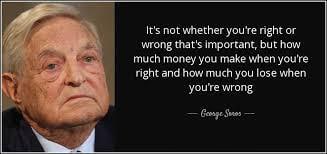
This quote by George Soros is the best archetype for risk and reward in any form of traded instrument. The most profitable traders have winning trades that are at least two times larger than their losing trades. The simple formula of profit in trading is having your winning positions (reward) exponentially larger than your losing positons (risk). The execution part is easier said than done mostly due to emotional and psychological reasons. However, it’s an essential factor for sustained and consistent profits.
Peter Lynch on why winning percentages are mostly irrelevant
In this business if you’re good, you’re right six times out of ten. You’re never going to be right nine times out of ten.
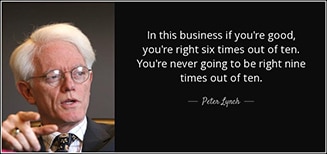
It seems as though trading is one of the few ventures where people obsess over being right all the time and failing to accept being wrong. Using simple mathematics, the probability of any trade outcome is 50% since the price can only travel in two directions. Over the long haul, anything higher than this percentage is rare if we consider the law of large numbers.
No trade set-up, statistically, has a higher probability than 50% no matter how much evidence and confirmation we can gather. Therefore, it’s paramount for traders to accept this reality and stay within the realms of acquiring small losses when they’re wrong and bigger winners when they’re right.
Jesse Livermore (1877-1940) on having a life outside of trading
There is time to go long, time to go short and time to go fishing.
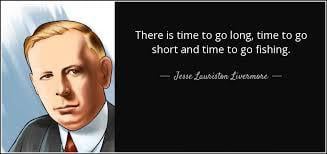
We can interpret this quote as a statement that enforces traders need to have a life outside of trading. Trading embodies the ‘less is more’ or 80-20 principles. Spending more time doing physical trading does not necessarily equate to more profits. The design of trading is more of a passive investment vehicle where significant gains exist in long-term positions instead of active trading.
Although there are so-called full-time traders, most of them have various other endeavors that complement their trading activities and don’t spend the vast majority of their time physically trading. Many people in highly-skilled professions such as doctors have led successful careers in their medicine and trading careers simultaneously.
Conclusion
When taking a break, we can always learn something from these legendary traders who have decades of experience having started in the business well before the internet age. It’s incredible to think that markets, besides their volumes, have not changed much technically. The same character traits to being successful 50 or more years ago are the same to be successful in today’s time.


